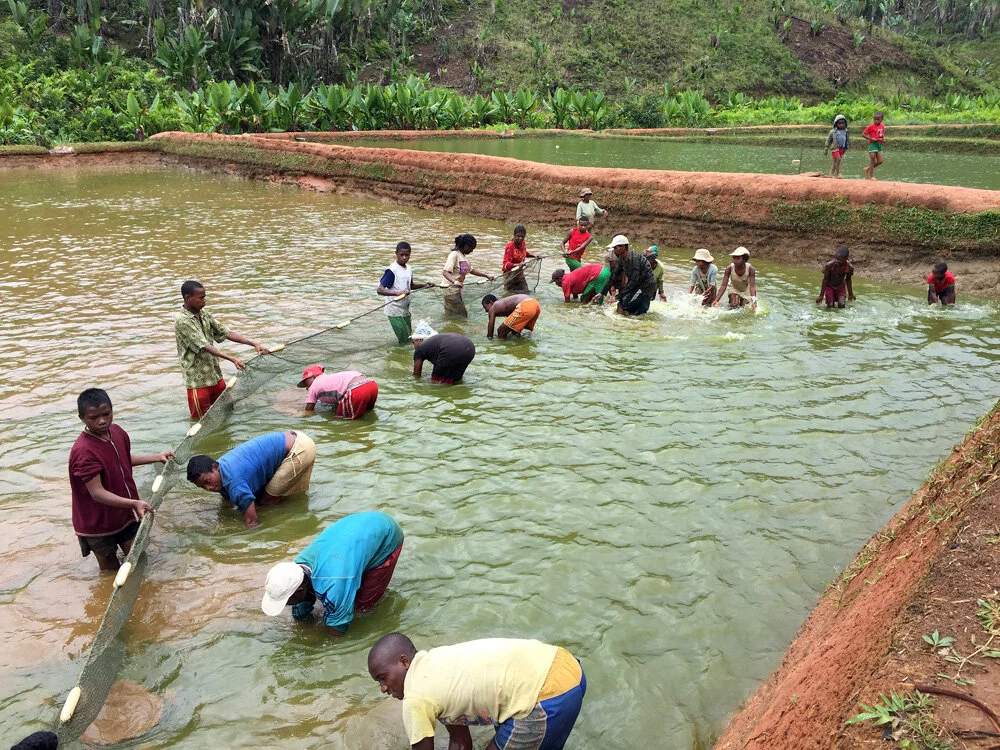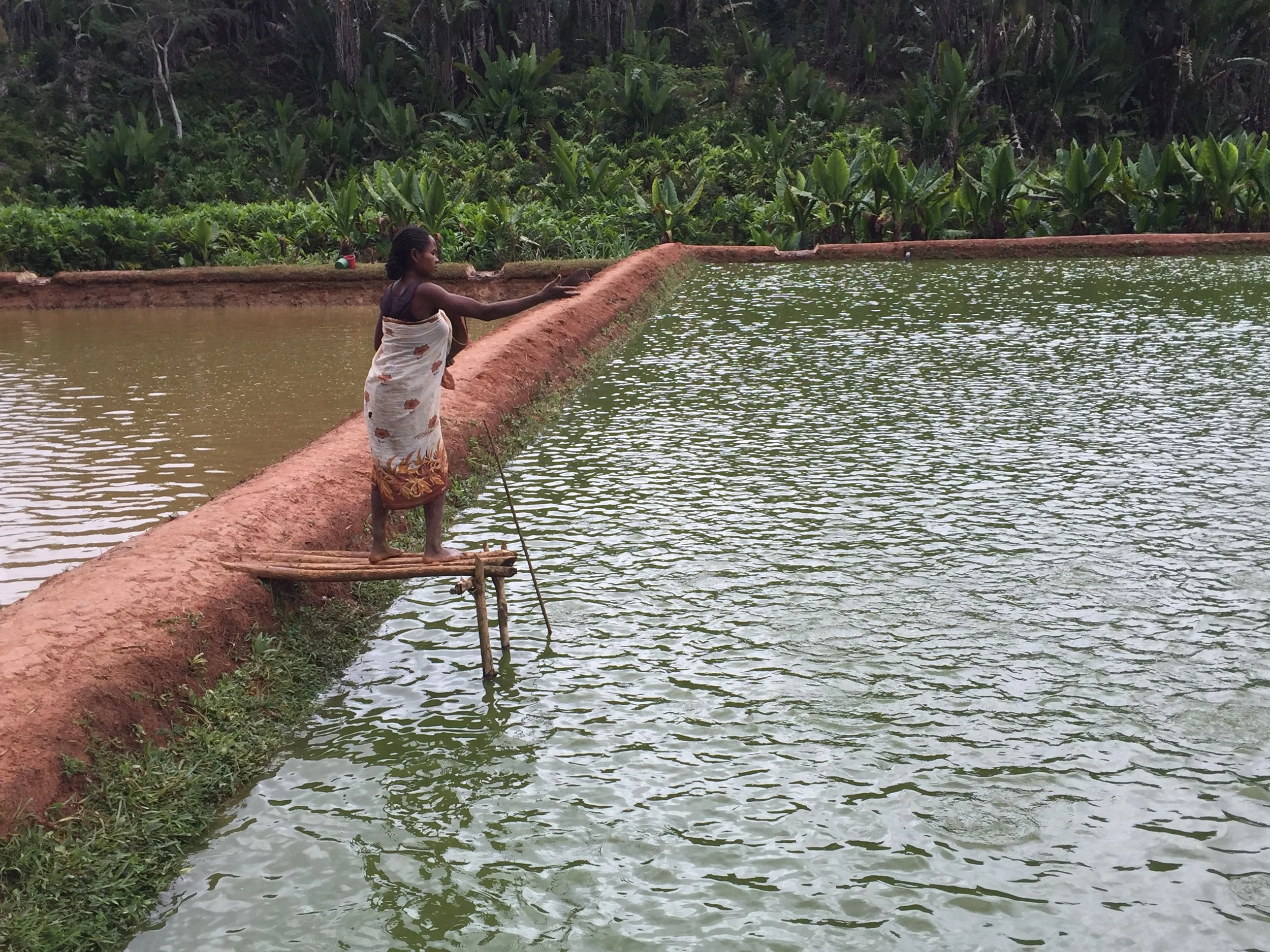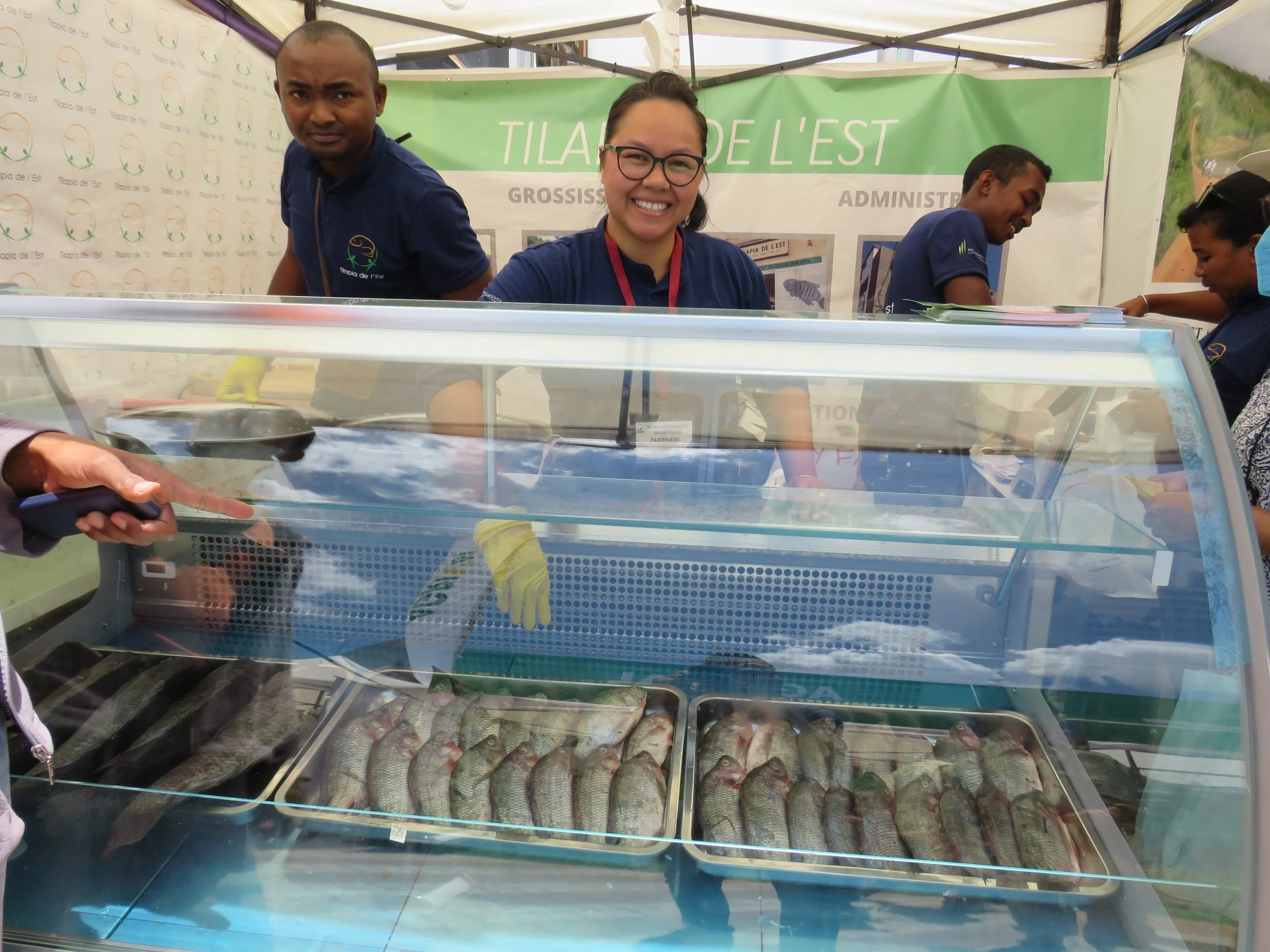Fish-farming as profitable local business development
Harvesting tilapia. The entire local cooperative and the families pitch in.
Although fish and other seafood is a vital natural resource on Madagascar, several attempts to achieve profitable freshwater fish farming have failed in the past. Since 2011, Norges Vel has developed the value chain of fish farming from egg to table as a climate resilient, sustainable industry. The objective is to reduce poverty, create more jobs and improve nutrition.
Among other things, the project has helped ensure that:
The fish-farmers tripled their monthly incomes
The number of climate resilient fish-farmers increased from 60 to 450
The production and sale of fresh tilapia on ice has increased from 40 tonnes in 2014 to 800 tonnes in 2022
Several thousand players in the value chain, ranging from pond builders via transporters to the sellers of fresh fish on ice, are earning stable incomes above the minimum wage
Country
Madagascar
Periode
2011 - 2023
Contact
Partner
Donor
External Evaluation
The gratifying results from this project led to Norges Vel being asked to test a similar model in Mozambique as from 2017.
The project is now trying to consolidate the fish-farmers' general business unit and the activities of the fish-farmers in order to ensure full sustainability before the project is scheduled to manage on its own after 2023.
A demanding value chain project
Challenges arise when fish-farmers engage in new forms of cooperation to achieve results. The participants' motivation for and confidence in the project are of the essence, and it is important to deal with the problems associated with pricing.
Sustainability is alpha and omega in all areas
Establishing a good system for fingerlings is essential and demanding, while nature and climatic conditions that include cyclones create challenges for fish-farming infrastructure. Zero tolerance for corruption is also key.
Sustainability is alpha and omega in all areas in environmental and climatic, organisational, social and financial terms. This is necessary if the organisation and jobs that have been created and developed are to continue to exist once the project is concluded. Organising all of this calls for cutting edge expertise in all parts of the value chain.
Project goals
Create profitable, climate resilient and sustainable local business development by reducing poverty, unemployment and malnutrition, and ensure that the project results have a high transfer value
Strengthen the economic base for 450 households, that is, more than 1800 individuals
Support the fish-farmers by organising and developing a fish-farmers' cooperative union made up of eight local cooperatives
Increase the coverage of costs for the cooperatives' union from 5 to 100 per cent
By 2023, produce 1440 tonnes of fresh tilapia sold on ice in the port of Tamatave and the capital city of Antananarivo
Contribute to the further development of the value chain (feed enterprises, sales channels)
Results
Economy, production and sales
Profitability ranging from less than USD 30 to more than USD 150 per month for 450 small-scale fish-farmers
Increase in the weight of the tilapia from 100 to 250 grams on average, and improve productivity adapted to market demand
Sell fresh fish on ice from an increasing number of sales outlets in the largest port town of Toamasina and in the capital Antananarivo
Ponds were stocked with fingerlings and harvesting/sales commenced in August 2012
A currently climate resilient hatchery was established and approved by the Malagasy authorities, and a local breeding programme was initiated in 2018 with regular expansion including a back-up hatchery from mid 2023
A cold store, feed storage and technical/administrative office are established in Tamatave as well as a system for fish reception, grading and transport
Social conditions, expertise and the environment
Climate-resilient, environmentally sustainable fish-farming techniques have been established for tilapia
Integrated human resources development measures aimed at fish-farming, business and organisation have been implemented and will be continued
30 per cent of the participants are women, and the efforts to promote equality continue
Organisation and cooperation
Collaboration with Asian, Norwegian, Malagasy and other relevant expertise
Seven cooperatives established with Norad support (and one with German GIZ support). These cooperatives help facilitate pond construction, distribute feed, harvest the fish, control the harvest, etc. for the small-scale fish-farmers/members
The fish-farmers' organisation Tilapia de l’Est (TDE) was established by the producers' cooperatives with support from Norges Vel. TDE owns the high-quality hatchery engaged in breeding, and contributes input/access to feed, technical assistance, business training, marketing/sales and dialogue with the authorities
Norges Vel's contribution and role
Project management and quality assurance from A to Z
Ensure equal opportunities for women and men
Ensure technical instruction and provide quality assurance for the fish-farming industry
Help ensure market access and product development for the fish-farmers
Ensure climate-resilient, sustainable development of fish-farming
Ensure human rights, decent working conditions and risk management
Provide instruction and advisory services related to strategy, financial management, organisation and business development
Lobby for sustainable framework conditions for the development of fish-farming and economic development on Madagascar in particular and in Africa in general
The sustainability goals in the project
In the autumn of 2015, UN member states adopted 17 goals for sustainable development by 2030. All of Norges Vels' projects support the sustainability goals.
This project contributes to:







